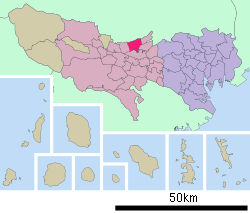Higashimurayama, Tokyo
| Higashimurayama 東村山市 | |||
|---|---|---|---|
| City | |||
|
Higashimurayama City Hall | |||
| |||
 Location of Higashimurayama in Tokyo Metropolis | |||
 Higashimurayama
| |||
| Coordinates: 35°45′16.6″N 139°28′6.6″E / 35.754611°N 139.468500°ECoordinates: 35°45′16.6″N 139°28′6.6″E / 35.754611°N 139.468500°E | |||
| Country | Japan | ||
| Region | Kantō | ||
| Prefecture | Tokyo Metropolis | ||
| Area | |||
| • Total | 17.14 km2 (6.62 sq mi) | ||
| Population (February 2016) | |||
| • Total | 150,984 | ||
| • Density | 8,810/km2 (22,800/sq mi) | ||
| Time zone | Japan Standard Time (UTC+9) | ||
| Symbols | |||
| • Tree | Zelkova serrata | ||
| • Flower | Azalea | ||
| • Bird | White wagtail | ||
| Phone number | 042-393-5111 | ||
| Address | 1-2-3 Honcho, Higashimurayama-shi, Tokyo-to 189-8501 | ||
| Website | Official website | ||
Higashimurayama (東村山市 Higashimurayama-shi) is a city located in the western portion of Tokyo Metropolis, in the central Kantō region of Japan. As of 1 February 2016, the city had an estimated population of 150,984 and a population density of 8810 persons per km². Its total area was 17.14 square kilometres (6.62 sq mi).
Geography
Higashimurayama is approximately in the north-center of Tokyo Metropolis, on the Musashino Terrace.
Surrounding municipalities
History
The area of present-day Higashimurayama has been inhabited since Japanese Paleolithic times, and numerous remains from the Jōmon, Yayoi and Kofun periods have been discovered. During the Nara period, it became part of ancient Musashi Province. During the Kamakura period, it was the location of the Battle of Kumegawa in 1333.
In the post-Meiji Restoration cadastral reform of April 1, 1889, several villages merged to form Higashimurayama Village in Nishitama District, at that time part of Kanagawa Prefecture. The entire district was transferred to the control of Tokyo Prefecture on April 1, 1893. On April 1, 1942, Higashimurayama Village became the town of Higashimurayama. On April 1, 1964, Higashimurayama was elevated to city status.
Economy
Higashimurayama was formerly an agricultural area, and was noted for its production of sweet potatoes. It is now primary a regional commercial center, and a bedroom community for central Tokyo.
Transportation
Railway
- JR East – Musashino Line
- Seibu Railway Company – Seibu Shinjuku Line
- Seibu Railway Company – Seibu Haijima Line
- Seibu Railway Company – Seibu Kokubunji Line
- Seibu Railway Company – Seibu Tamako Line
- Seibu Railway Company – Seibu Ikebukuro Line
- Seibu Railway Company – Seibu Seibu-en Line
- Seibu Railway Company – Seibu Yamaguchi Line
Education
Higashimurayama has 15 public elementary schools, seven public middle schools and three private combined middle/high schools. The city also has two public high schools.
Local attractions
- The oldest intact building in Tokyo and one of only two buildings in Tokyo registered as a National Treasure of Japan; the Jizo hall in the temple of Shōfuku-ji.
- Hachikokuyama, a park that is an inspiration for My Neighbor Totoro.
- National Hansen's Disease Museum of Japan
- Site of the 14th century Battle of Kumegawa
- A segment of the ancient Kamakura Kaido highway
Sister cities
Higashimurayama is twinned with the following cities:[1]
| City | Region | Country | Year |
|---|---|---|---|
| Kashiwazaki | |
|
1996 |
| Independence | |
|
1978 |
| Suzhou | |
|
2005 |
Noted people from Higashimurayama
- Seiichiro Shimizu – Politician
- Ken Shimura – Comedian
- Shoko Aida – Singer
- Miki Nakatani – Actress
- Shōji Satō – Professional Badminton Player
References
- ↑ "Sister Cities". Retrieved 5 May 2014.
- "東村山市ホームページへようこそ!". Higashimurayama City Official Site. June 2007. Retrieved 2007-10-31.
- "Tokyo Metropolitan Government<Welcome to TOKYO Waterworks>" (PDF). Tokyo Metropolitan Government<Welcome to TOKYO Waterworks>. January 2005. Retrieved 2007-10-31.
External links
| Wikimedia Commons has media related to Higashimurayama, Tokyo. |
- Official website (Japanese)

